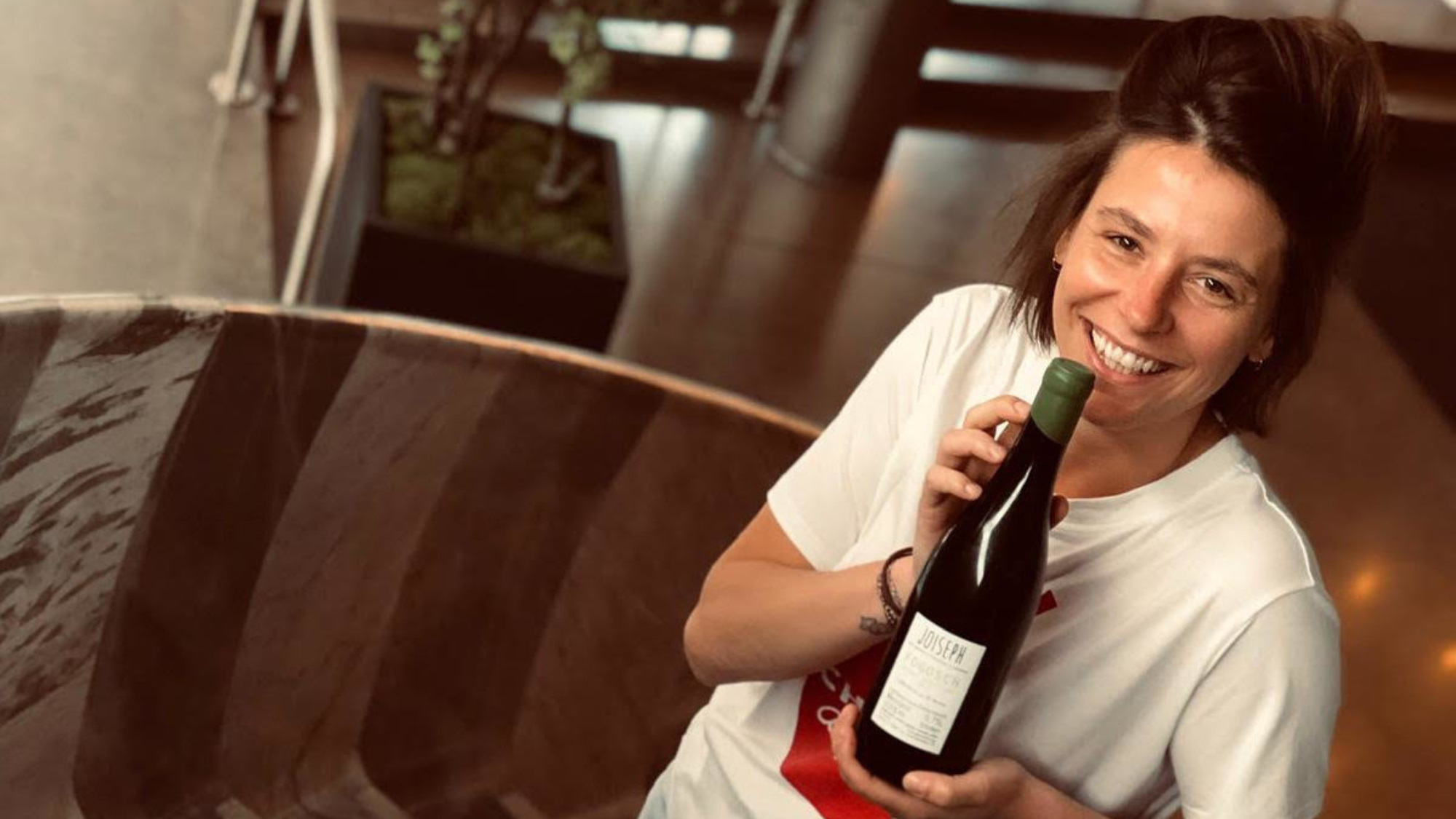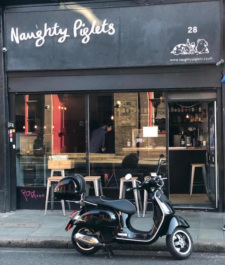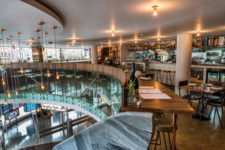Naughty Piglets
Brixton
Close

Naughty Piglets opened in Brixton in 2015, a forerunner of the growing movement of neighborhood restaurants. Margaux and her then-partner opened the small restaurant to reflect their past experiences — from Michelin-starred Trinity to natural wine bar Terroirs. Margaux is originally from Lyon, France, where she studied business and came to London to explore the world of hospitality, and hasn’t looked back since.
In 2017, The Other Naughty Piglet opened, a restaurant in The Other Palace Theatre in Victoria which she describes as the “same vibes, but more seats”.
How would you describe your restaurants?
They are very similar in concept but we try and keep them distinctive through the menus and wine lists. Naughty in Brixton is a neighbourhood, small, quirky wine bar. The Other, in Victoria, is a more glamorous open space, sitting on the first floor of a theatre. The clientele is quite different but we are getting more and more guests coming for us [at The Other Naughty Piglet] and what we do, rather than because we are in a theatre.
Does your French background influence your restaurants?
We are a British bistrot with a French accent! I think comparing a style of dining or diners is a very broad question, too broad to not get carried away. I would say though, that England, because it has less of a defined food and wine culture than France, it has everything to build on — which is what has made Naughty Piglets possible.

What was the process like to open your first restaurant and what pushed you to do this?
I think from the time the idea was born, it took maybe a year and a half — it took six months just to hunt for sites!
I am an impatient dreamer and thought it would happen much sooner. But, from drawing up a business plan, the restaurant design, getting a loan, finding the right site, to then negotiating with the landlord and previous tenant — it took a while.
The idea of having my very own business before turning 30 has always been my biggest drive and desire.
You originally studied business, in France — in one of the best food cities in Europe — what made you decide to come to London and work in hospitality?
I participated in an internship in London a few years before moving here, and fell in love with the city — I believe it’s a city that never sleeps! I studied management and finance in Lyon, and moved to London as soon as I got my MBA, which was nine years ago, and started working in hospitality as soon as I arrived.
Food and wine has always been key in my life. Being sat with people you love, eating good food and drinking wine is what defines magic. Being able to combine food, wine and people is a happy triangle for me — and so hospitality is to me what water is to fish.
In this industry you may work many long hours, sometimes have bad days, serve very rude or uninterested guests, as in any other industry. But, the beauty in hospitality is that every day is unique, you get to have an impact on people’s mood, you get to share and convey ideas and knowledge — on grapes, ingredients, styles of service, philosophies. You also get to work with so many great people, who all come from such different backgrounds.
It is nourishing, overwhelming, exciting, challenging, all for the mind and the soul. That’s what is keeping me in this industry.
What is the challenge of running such a small 30-seater restaurant [Naughty Piglets]?
You come across so many (daily) unexpected challenges, you would not believe! What I do like is that you don’t have time to faff around, you react and move on.
The most rewarding moments of our business are seeing a member of staff evolving so much; a customer leaving genuinely happy, when they were very reserved at first; surrounding yourself with people who share the same passion.

You serve low intervention wines. What does that mean and how can guests begin to understand it?
Let’s begin in highlighting that natural or low intervention wine, is wine. So, it’s not quite about being adventurous or unusual, it’s about caring. Caring about Mother Nature, organic farming, the patience, perseverance and the hard work of a wine maker and the uniqueness of a terroir.
What does this mean? It starts in the vineyards with no chemicals, pesticides, or very little machinery, and hand harvested grapes. Then nothing taken, nothing added, or very little sulphur, sulphites or c02, little to no filtering.
In conventional and in natural wine making, some are great at it, some are less great at it, some are experimental and some are pretty terrible. It’s good to not put a label on a philosophy or the art of wine making — let’s not forget that it’s about one’s belief, philosophy and taste.
Although I might appreciate the taste of a wine, I would need to know how it’s made and why, before putting it in the wine list. And so, from that point, it’s about education and conveying what you believe is good; it’s the very beautiful and so very subtle cycle between the winemaker, the supplier, the owner, the staff and the customer. None of the five can be disregarded.
Some customers would be skeptical, but I strongly believe there’s a wine for everyone. People should spend more time listening to their guests’ tastes rather than trying to sell what they’d like to drink. It takes time but there’s no reason why the way people care about what they eat shouldn’t be 100% aligned with what they drink.